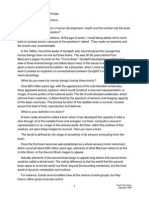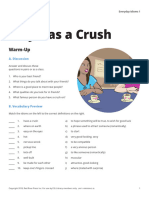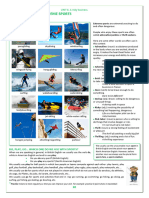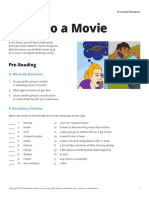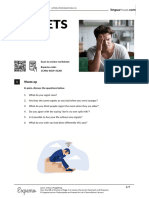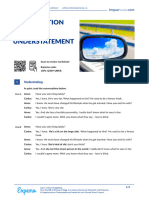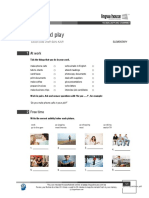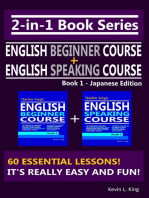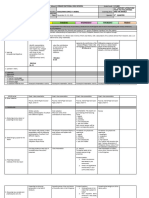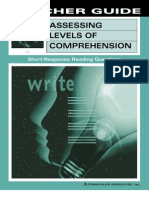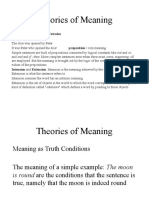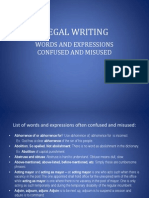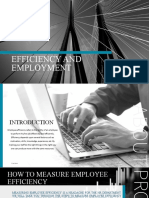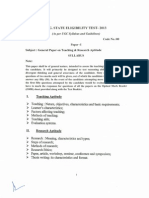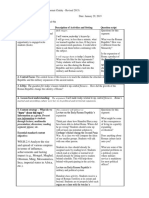Hobbies and Activities Ielts Speaking Part 2
Uploaded by
Houda MatirHobbies and Activities Ielts Speaking Part 2
Uploaded by
Houda MatirA A IELTS SPEAKING PART 2
Hobbies and activities
Lesson code: 1122-62FA-DVPP
1 Warm-up
How many different hobbies and activities can you think of? Continue the list below.
cooking jogging knitting collecting stamps gardening playing board games
2 Expressions of frequency
Match the two parts to form `less common' expressions of frequency.
1. every a. daily basis
2. on a b. I can
3. whenever c. now and then
4. every d. other day
Now match the phrases above to the more common expressions of frequency below.
1. once every two days
2. every day
3. as often as possible
4. from time to time
Think of an activity that you do. Describe how often you do it with expressions from this exercise.
3 Reasons
Complete the possible reasons why someone would do a particular hobby. What hobbies or activities
could they be describing?
broadens fit relax relaxing relieve
1. I find it very .
2. It helps me .
3. It keeps me .
4. It my knowledge.
5. It helps me stress.
You can review this worksheet online at www.linguahouse.com/ex 1/2
Review your flashcards at least 3-5 times a week for 20 minutes to keep the material fresh in your memory.
c
Linguahouse.com
Hobbies and activities
A A A A IELTS SPEAKING PART 2
4 Practice
Work in pairs. Take turns to answer the cue cards below. Try to use vocabulary from this lesson.
Remember, you have 1 minute to take notes and 1-2 minutes for talking.
Describe an activity that you enjoy. You should say:
- where you do it
- who you do it with
- how often you do it
And say why you enjoy it.
Describe a hobby you had when you were a child. You should say:
- what it was
- what was involved in this hobby
- how you became interested in this hobby
And explain why you liked doing it.
Describe an outdoor activity that you like doing (or do regularly). You should
say:
- what this activity is
- where you do it
- when you do it
And say why you like it.
You can review this worksheet online at www.linguahouse.com/ex 2/2
Review your flashcards at least 3-5 times a week for 20 minutes to keep the material fresh in your memory.
c
Linguahouse.com
Hobbies and activities - Key
A A A A IELTS SPEAKING PART 2
1- Warm-up
Possible answers (encourage some unusual hobbies for fun): hiking in the mountains, listening to music, reading,
watching TV, bird watching, trainspotting, travelling, etc.
2- Expressions of frequency
Students work individually and check in pairs. Go through the answers. If students are aiming for Band 7 or higher,
explain that using some less common vocabulary can help them achieve a high score for Lexical Resource, one of
the four scoring criteria used to assess IELTS Speaking candidates.
1. d
2. a
3. b
4. c
1. every other day
2. on a daily basis
3. whenever I can
4. every now and then
3- Reasons
1. relaxing
2. relax
3. fit
4. broadens
5. relieve
You can review this worksheet online at www.linguahouse.com/ex i
Review your flashcards at least 3-5 times a week for 20 minutes to keep the material fresh in your memory.
c
Linguahouse.com
You might also like
- How Writing Works - A Field Guide To Effective Writing, 2nd Edition100% (4)How Writing Works - A Field Guide To Effective Writing, 2nd Edition327 pages
- ESL Brains What Makes A Great Corporate Culture SV 8423No ratings yetESL Brains What Makes A Great Corporate Culture SV 84234 pages
- At A Supermarket British English TeacherNo ratings yetAt A Supermarket British English Teacher12 pages
- Dr. Keith Buzzell - Going Beyond Self As Image100% (1)Dr. Keith Buzzell - Going Beyond Self As Image8 pages
- 02 - ESL-Brains-Ive-been-doing-it-for-a-week-and-I-love-it-SV-5149No ratings yet02 - ESL-Brains-Ive-been-doing-it-for-a-week-and-I-love-it-SV-51495 pages
- Bucket List Wishes British English Intermediate Group100% (1)Bucket List Wishes British English Intermediate Group4 pages
- DELTA IELTS Games and Activities - Win With Words - Online - Chal...No ratings yetDELTA IELTS Games and Activities - Win With Words - Online - Chal...3 pages
- Topic 1: Human Reactions To Extreme Conditions + Extreme Sports Pros& ConsNo ratings yetTopic 1: Human Reactions To Extreme Conditions + Extreme Sports Pros& Cons10 pages
- Difficulties On The Phone British English Student Ver2 BWNo ratings yetDifficulties On The Phone British English Student Ver2 BW2 pages
- Describing Character and Behaviour British English TeacherNo ratings yetDescribing Character and Behaviour British English Teacher8 pages
- Describing A Friend British English StudentNo ratings yetDescribing A Friend British English Student7 pages
- ESL Brains Unusual Ways of Using Food SV 2531No ratings yetESL Brains Unusual Ways of Using Food SV 25315 pages
- Giving Opinions ESL Activities Games WorksheetsNo ratings yetGiving Opinions ESL Activities Games Worksheets6 pages
- Common Expressions 1: Lingua House Lingua HouseNo ratings yetCommon Expressions 1: Lingua House Lingua House2 pages
- Motivating Speaking Activities For Lower LevelsNo ratings yetMotivating Speaking Activities For Lower Levels5 pages
- Booking A Vacation American English TeacherNo ratings yetBooking A Vacation American English Teacher5 pages
- 29c5fc8 - Exaggeration and Understatement British English Teacher Ver2No ratings yet29c5fc8 - Exaggeration and Understatement British English Teacher Ver25 pages
- Work and Play: Lingua House Lingua HouseNo ratings yetWork and Play: Lingua House Lingua House5 pages
- What Is Your City Like - General - Grammar - Too Much, Too Many, (Not) EnoughNo ratings yetWhat Is Your City Like - General - Grammar - Too Much, Too Many, (Not) Enough21 pages
- 1outcomes 2 Pre Intermediate Student S BookNo ratings yet1outcomes 2 Pre Intermediate Student S Book212 pages
- Lesson Plan: Content: Grammar: Verb Will/ Won't For Predictions and DecisionsNo ratings yetLesson Plan: Content: Grammar: Verb Will/ Won't For Predictions and Decisions8 pages
- I've Lived Here For Ten Years (Present Perfect + For - Since)No ratings yetI've Lived Here For Ten Years (Present Perfect + For - Since)25 pages
- Become A Confident English Speaker SV PDFNo ratings yetBecome A Confident English Speaker SV PDF4 pages
- Business English Intermediate Review 5 British English StudentNo ratings yetBusiness English Intermediate Review 5 British English Student7 pages
- ESL Brains - I Wish I Could But I Don't Want To100% (2)ESL Brains - I Wish I Could But I Don't Want To33 pages
- Functioning in English: An Intermediate-Plus Review of Everyday Functional English ExpressionsFrom EverandFunctioning in English: An Intermediate-Plus Review of Everyday Functional English Expressions1/5 (1)
- 2-in-1 Book Series: Teacher King’s English Beginner Course Book 1 & English Speaking Course Book 1 - Japanese EditionFrom Everand2-in-1 Book Series: Teacher King’s English Beginner Course Book 1 & English Speaking Course Book 1 - Japanese EditionNo ratings yet
- Study Session 1 Basic Concepts of Mis: By: Tercino, Razel and Gazo, John MarkNo ratings yetStudy Session 1 Basic Concepts of Mis: By: Tercino, Razel and Gazo, John Mark11 pages
- Prac&cal-3: Practicing Wisdom Assessment Scale AIMNo ratings yetPrac&cal-3: Practicing Wisdom Assessment Scale AIM18 pages
- Theories of Meaning: Intension and Extension. Intension Is The Meaning Achieved by The Words in The SentenceNo ratings yetTheories of Meaning: Intension and Extension. Intension Is The Meaning Achieved by The Words in The Sentence31 pages
- Stylistic Analysis of 40-Love Written by McGoughNo ratings yetStylistic Analysis of 40-Love Written by McGough3 pages
- Code No.:OO Paper - I Subject: General Paper On Teaching Research Aptitude SyllabusNo ratings yetCode No.:OO Paper - I Subject: General Paper On Teaching Research Aptitude Syllabus7 pages
- Questions 1-5: Write A Sentence Based On A Picture Directions: in This Part of The Test, You Will Write ONE Sentence That Is Based On A PictureNo ratings yetQuestions 1-5: Write A Sentence Based On A Picture Directions: in This Part of The Test, You Will Write ONE Sentence That Is Based On A Picture13 pages
- Modul 10: Blue, and Sharp Are Descriptive, and They Are All Examples of Adjectives. Because100% (1)Modul 10: Blue, and Sharp Are Descriptive, and They Are All Examples of Adjectives. Because6 pages
- The Social Situation of Child DevelopmentNo ratings yetThe Social Situation of Child Development29 pages







